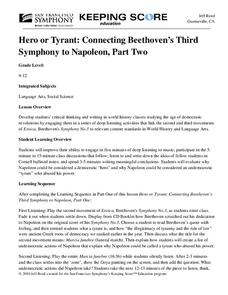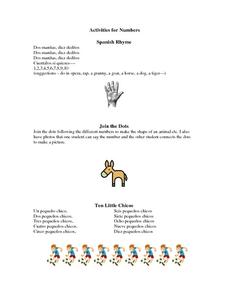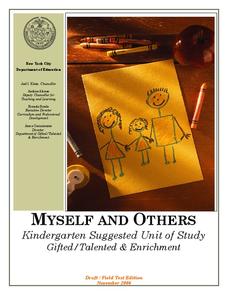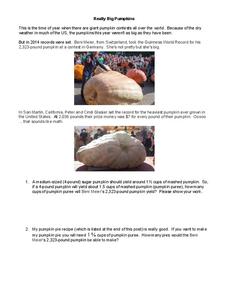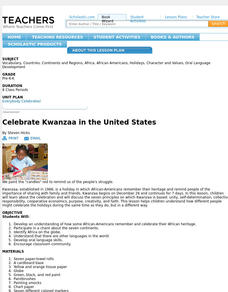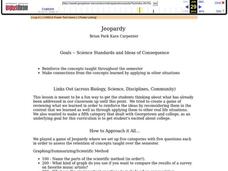San Francisco Symphony
Hero or Tyrant: Connecting Beethoven’s Third Symphony to Napoleon, Part Two
Was Napoleon a tyrant or a hero? Answers could vary depending on the political point of view. Learners listen to Beethoven's Symphony #3 while considering Napoleon's undemocratic tyranny. They listen to the piece in five parts, each time...
Perkins School for the Blind
Conversation Skills
It is so important for learners with multiple disabilities to learn how to communicate for both social and functional reasons. Each child will choose a topic from the list and generate five questions related to that topic. They'll split...
Perkins School for the Blind
Put the Shoe on Your Foot
Promote clothing identification, body part identification, and dressing skills acquisition with a fun and lively game. Each child takes turns grabbing a clothing item from the central clothing box. As he puts the item on, he sings, "Put...
Dig-It Games
Mayan Mysteries
Who is Ladrone? Join Fiona and Charlie as they accompany their Uncle Alex to Guatemala to help Chief Mateo determine the identity of the elusive Ladrone and solve Mayan mysteries. Players of this interactive game learn much about Mayan...
Perkins School for the Blind
I'm Thinking Of...
Learning how to describe an object or a person is a great way to develop verbal and written expression. Learners with special needs improve their verbal expressive skills and concept development skills while playing a guessing game. The...
Road to Grammar
Fame
Smile for the camera and find out how your English language learners feel about fame! Class members read three different points of view on fame and then discuss ten questions about the topic.
Sean Banville
New Year's Day
Focus on a passage about the new year with your English language learners. You can start with reading the passage aloud to your class, and then launch into the related activities. Pupils match phrases, complete cloze-style activities,...
Nebraska Department of Education
Activities for Numbers
Looking for ideas for teaching numbers to your Spanish class? Try out one or all of these 16 activity ideas!
K12 Reader
Figurative Language: Edgar Allan Poe’s “The Bells”
Bells, bells, bells abound in a worksheet designed for Edgar Allan Poe's famous poem "The Bells." Middle schoolers are asked to identify the various poetic devices Poe employs.
New York City Department of Education
Myself and Others
Self reflection is an important skill to reinforce in our children, and it's especially helpful to help them realize who they are in the context of their environment. A collection of lessons about self image and community encourage...
Yummy Math
Really Big Pumpkins
You may think your holiday pumpkins weigh a ton, but in a giant pumpkin contest, they actually do! Middle schoolers read about the winners of the 2014 giant pumpkin contests before solving three word problems involving multiplication and...
Mississippi Whole School Initiative
Dream Big...With Your Eyes Wide Open
For many people, Barack Obama's presidency was the next step in Martin Luther King, Jr's dream of America's future. Explore the dreams of Americans past and present, as well as the young Americans in your class, with a set of activities...
Louisiana Department of Education
Out of the Dust
The Grapes of Wrath may be the most famous novel set during the Dust Bowl, but what other stories cover the same time? The unit focuses on the Karen Hesse novel Out of the Dust. Learners keep a timeline of the Dust Bowl, maintain a...
American Museum of Natural History
Silk Road Fables
Talk about rabbit holes! With just this one resource, learners can travel the Silk Road listening to fables, meet a scientist who studies poisons (and whose favorite book is Alice in Wonderland), and listen to a video interview of an...
Curated OER
The Turn of the Nineteenth Century: Lifestyles and Cultures
Student reflect on the differences between the life of children in the early
nineteenth century and their lives in the present. They demonstrate these differences by creating a drawing of "then and now." In addition, they create a...
Curated OER
A Visit to the Madrid Zoo
Students conduct research on animals by visiting the website for the Madrid Zoo. They locate various animals on the website and answer questions about animals and their habitats in Spanish, then create a poster, advertisement, or a press...
Curated OER
Celebrate Kwanzaa in the United States
Explore the components of the African American celebration of Kwanzaa in the United States. Complete with learning objectives, a materials and preparation list, and eight days of lesson plans, the resource incorporates the principles of...
Curated OER
Brief Encounter (Looking at Ourselves and Others)
Learners participate in a simulation game in which they realize what it is like to be from another culture. They observe and describe different behaviors. They also examine values from other cultures.
Curated OER
Jeopardy
High schoolers played a game of Jeopardy where there was five categories with five questions each in order to assess the retention of concepts taught over the semester. The categories included: Graphing/Summarizing/ Scientific Method,...
Curated OER
Placing Artificial Domiciles to Attract Bumble Bees
Young scholars investigate how to entice bumble bees to accept artificial domiciles. They conduct research about bee biology and nest architecture, plan and construct an artificial domicile to attract bumble bee queens, and monitor and...
Curated OER
Concept Formation Lesson Plan: Understanding "Protest"
After analyzing both examples and non-examples of a variety of protests conducted by ethnic groups in Seattle and the state of Washington during the twentieth century, your class members will work to identify the key ideas and components...
Curated OER
Telling Our Own Stories
Explore online profiles and social media with your middle and high school classes. Use blogs to inspire your class to craft a well-written, thoughtful response to a prompt you give. A few example prompts are given.
Curated OER
Tennessee Vocabulary
In this recognizing proper nouns about the state of Tennessee learning exercise, students read the names in the word bank and match them with their descriptions. Students match 10 answers.
Curated OER
Lesson: Elizabeth Peyton: Artist's Community: The Real
What is real or imagined? The lines of beauty reality, and imagination are blurred in Elizabeth Peyton's portraits of her community. Learners analyze her use of artistic technique in conveying real and imagined communities. They then use...


